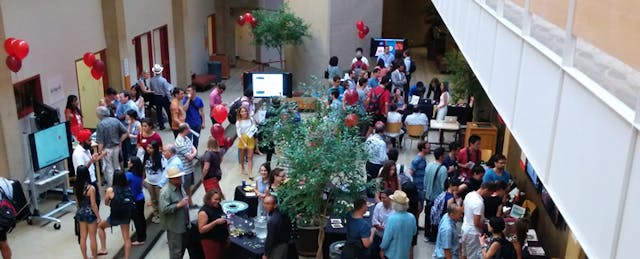Take two parts grounded learning theory, one-half part human-centered design and one whopping Silicon Valley part of technology innovation, and you might come up with something like the Stanford School of Education's Learning, Design and Technology program.
In its 16th year, the program (and it’s doctoral equivalent, Learning, Sciences, Technology, and Design) continues to push the boundaries on how well-designed technology can facilitate authentic learning.
Much like last year's cohort, the 2014 LDT Expo--a day-long presentation of Master’s projects--shied away from STEM, Common Core, and other K-12 trends. Instead, many students focused on socio-emotional learning, language learning, design, creativity and collaboration.
Whether or not these types of tools can find a place in the education marketplace (there were at least two VCs among the forty “expert” reviewers) remains to be seen. But there is certainly a demand for what LDT Program Director, Karin Forssell, describes as “programs in this space that are academically grounded, based on scholarship, and yet seek to impact the real world.”
She adds that while the number of applicants are rising every year, the quality remains “extremely high.” That should be a good sign for an industry that has historically been slow to incorporate research into practice.
Here’s an overview of projects from this year’s expo:
TandemArt is a web-based interactive museum experience for pre-literate children and their caregivers.
LittleBooks are interactive books uniquely designed to help people learn second languages
Expressway is helping kids learn to identify and express their emotions while they’re in the car with their family.
Musicasa is an iPad application that engages children ages 4-8 and their parents to help them develop a deeper and more personal understanding of music.
UqaYou is a digital grammar program that teaches the grammatical rules of the Inupiaq language.
Wholly Cow is a digital portfolio that provides youths with the forum to explore and celebrate holistic learning experiences that matter.
Periscope presents tangible books which expose children to stories told from multiple perspectives using augmented reality.
StickyUnit allows pre-service teachers to craft cohesive units from Common Core standards using a backwards planning framework.
<something> Epic is a cooperative board game that helps students in life transitions slow down, share stories, and be mindful.
Beity is designed to meet the need for preliminary trauma therapy and PSTD prevention for resettled Syrian children living in camps.
Kibuni is an interactive and open-ended “create” set that merges the developmental benefits of construction with writing and drawing.
Reporting from Zones of Conflict provides a virtual educational exchange for local and international journalists.
Make Me builds learners’ creative confidence with daily microactivities that activate divergent thinking and combat functional fixedness.


